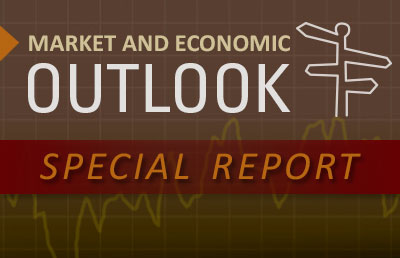
U.S. stock market volatility and a possible correction are balanced by fundamental economic strengths that should encourage long-term investors to look for opportuni...
In the October 2014 issue of Market and Economic Outlook, we reported that volatility in the stock market has picked up dramatically in the last couple of weeks. Situations around the world point to continued uncertainty in the near-term, but investors need to look past the negatives to the fundamental strength of the U.S. economy and the opportunities a correction creates.
Measuring volatility
The Chicago Board of Options Exchange Market Volatility Index (VIX), which is derived from prices paid on stock options, has spiked from 12 to 30, the highest reading since February. The higher VIX reflects a greater fear of future declines. To put the current number in perspective: During the 2011 European debt crisis, the VIX peaked at 40, and reached as high as 80 during the 2008 – 2009 financial crisis.
Few will deny that the U.S. stock market has enjoyed a great run since 2009, nearly tripling in value. Investor complacency, as measured by various sentiment indicators, has been high or extremely high for some time. As a result, the negatives facing the market like slowing global economic growth, the end of central bank quantitative easing (QE), the Ebola epidemic in West Africa, Islamic State of Iraq and Syria (ISIS) terrorism spreading across the Middle East, and the Russia-Ukraine conflict were, in retrospect, not priced into world stock markets. The outlier in this correction is the Ebola virus and how well the government contains the situation.
A market correction is not unexpected
We have not seen a correction of 10 percent or more in the U.S. stock market since the summer of 2011. Historically, 10 percent corrections occur much more frequently. The last three years have been characterized primarily by an up stock market and little volatility. We spent a great deal of time discussing this in our July issue of the Market and Economic Outlook and stated that corrections are necessary to maintain a healthy, long-term bull market. They should be viewed as a positive for long-term investors as they rid the market of excesses and move stocks into stronger hands.
Positives outweigh negatives
“We continue to see many positives in the economy and capital markets, and believe this is nothing more than a normal equity market correction,” says Tony Hallada, CEO of CliftonLarsonAllen Wealth Advisors, LLC.
He points to several indicators of fundamental economic strength:
- Record profits for the S&P 500
- Record levels of cash are on corporate balance sheets
- Consumer debt service coverage is the best in 25 years
- Job openings are the highest in 10 years
- Interest rates are at record lows
- 20 percent lower oil and energy prices
Buying opportunities
Long-term investors with cash will likely want to view this correction as a buying opportunity. It is also providing an incentive for investors to rebalance portfolios, which requires selling the investments that are high and re-allocating some of those funds to less expensive assets, such as equities.
“Many of our portfolios are highly diversified to weather market volatility,” Hallada says. “High quality bonds have been increasing in value during the past three weeks while the equity market corrects. Portfolios that own both of these asset classes have witnessed much lower volatility than a portfolio of 100 percent risk assets.”
He adds that private investment offerings (private real estate, private credit, private equity) have added huge value in helping qualified clients deal with money anxiety since these investments do not price every day.
Recession fear is low
A stock market correction can turn into a bear market, but it is difficult to see that happening without a U.S. recession. Given the strong domestic economic fundamentals and a still-accommodative Federal Reserve interest rate of 0 percent, the probability for a U.S. recession appears low at this time.
“Stock market corrections can be emotional. They create fear and hasty decisions, which great investors like Warren Buffet feast on by buying when everyone else is selling,” Hallada adds. “One of the greatest values we offer our clients is to help them deal with the emotions created by volatile markets and to view the situation from a non-emotional perspective. Long-term investors should see the recent pullback as a buying opportunity to put new cash to work.”
Hallada concludes by saying that during times of market corrections, he likes a quote from Warren Buffet: “Be fearful when others are greedy and greedy when others are fearful.”
